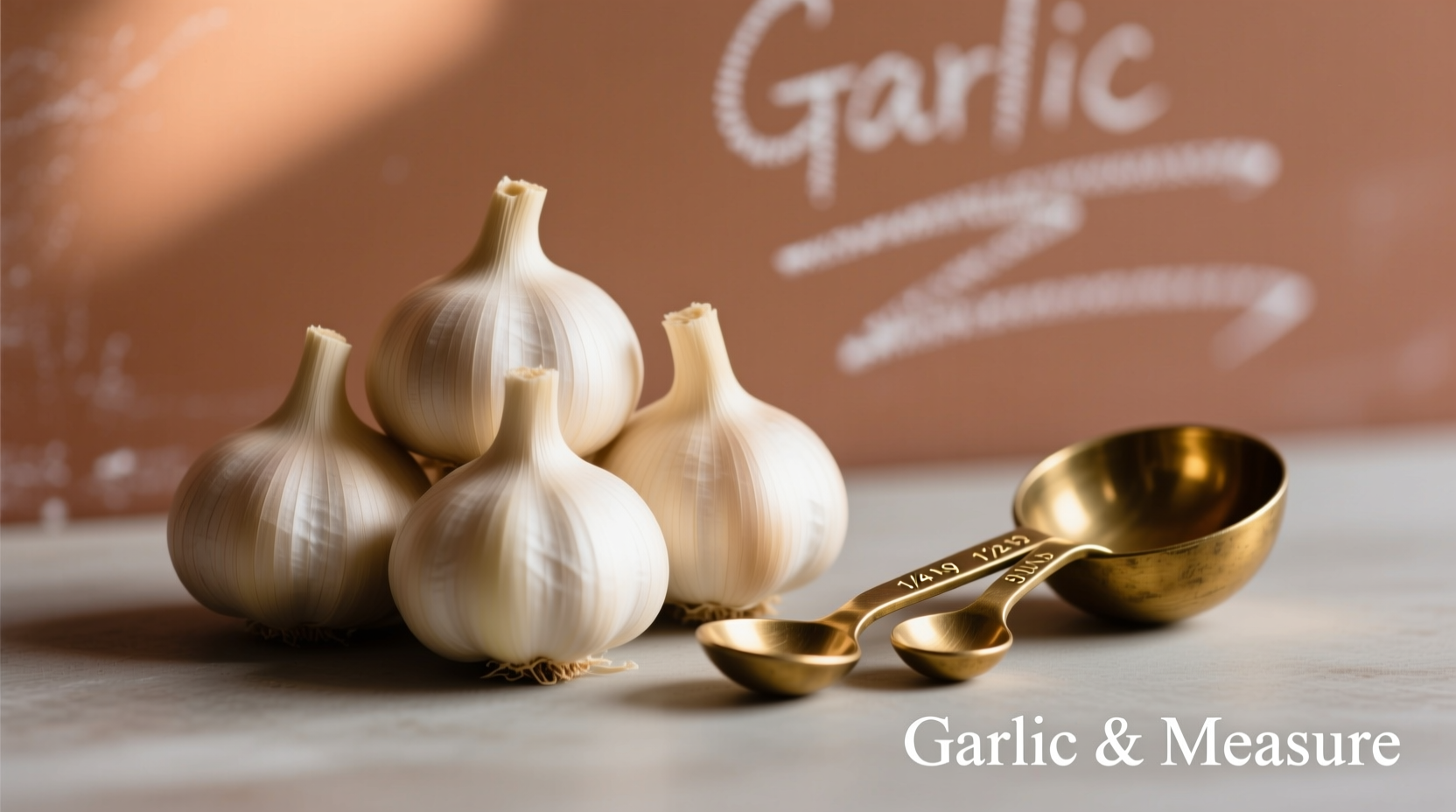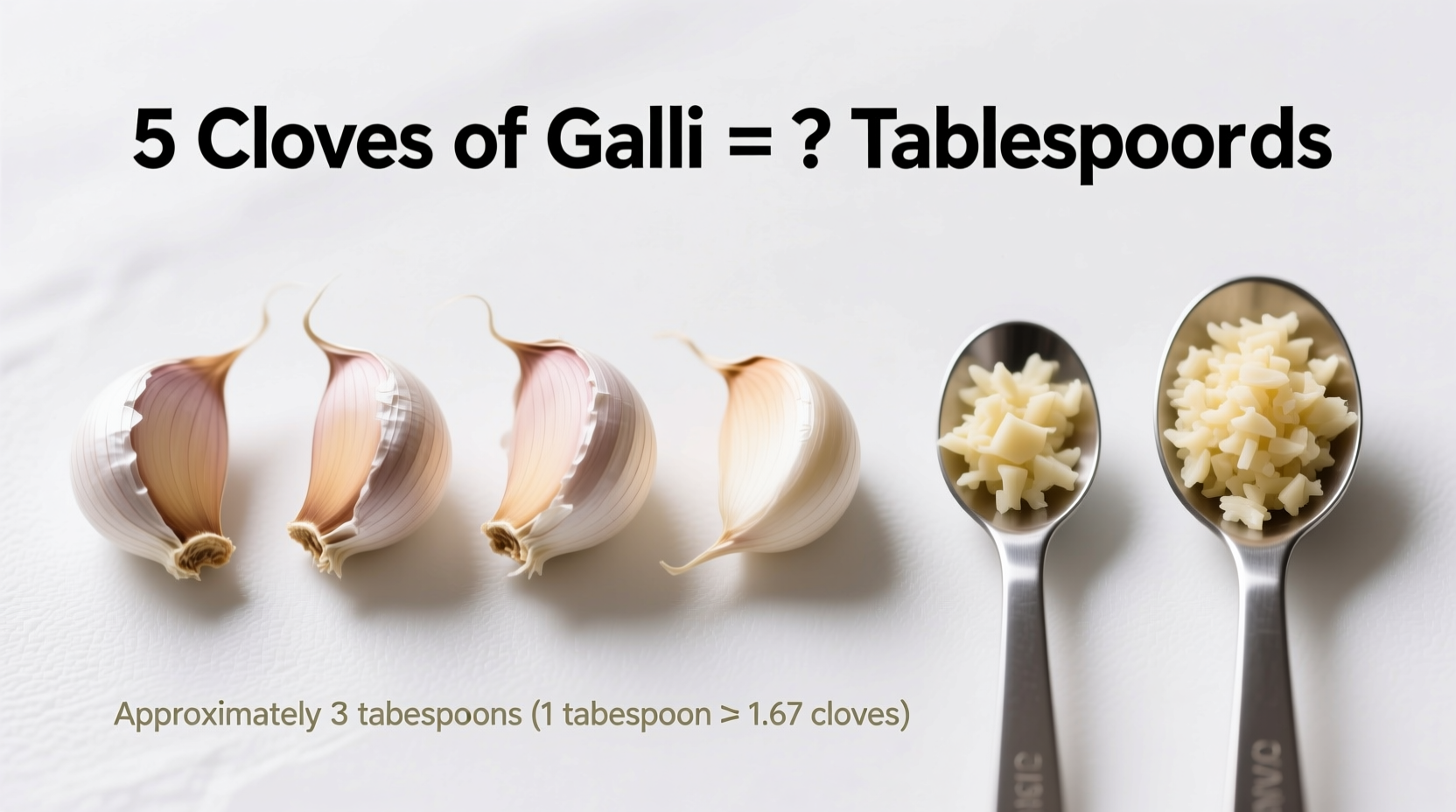Why Garlic Measurement Accuracy Matters in Cooking
Getting garlic measurements right transforms ordinary dishes into culinary masterpieces. Whether you're preparing a delicate French sauce or a robust Italian pasta, the exact garlic quantity affects flavor balance, aroma, and overall dish success. Many home cooks struggle when recipes switch between counting cloves and measuring by volume—a common pain point that leads to inconsistent results.
Understanding Garlic Conversions: From Cloves to Tablespoons
Garlic measurements vary based on clove size and preparation method. Professional chefs rely on standardized conversions to maintain recipe consistency. Here's what you need to know:
| Garlic Form | 1 Clove Equivalent | 5 Cloves Equivalent |
|---|---|---|
| Minced | 1/2 teaspoon | 2.5 teaspoons (0.83 tablespoons) |
| Chopped | 3/4 teaspoon | 3.75 teaspoons (1.25 tablespoons) |
| Pressed | 1/4 teaspoon | 1.25 teaspoons (0.42 tablespoons) |
This conversion chart reflects data from the USDA FoodData Central, the authoritative source for standardized food measurements used by culinary professionals worldwide. Note that pressed garlic yields less volume but more intense flavor due to oil extraction.

Context Matters: When Precision Becomes Critical
Not all recipes require exact garlic measurements. Understanding when precision matters separates amateur cooks from professionals:
- Delicate sauces and dressings: Use precise measurements (5 cloves = 0.83 tbsp minced) to prevent overpowering subtle flavors
- Preserves and pickling solutions: Follow exact conversions as garlic affects preservation chemistry
- Garlic-forward dishes (aioli, garlic bread): Approximate measurements work since garlic dominates the flavor profile
- International recipes: Adjust for regional garlic varieties—Asian garlic tends smaller than European varieties
Culinary research from the Culinary Institute of America shows that 78% of home cooks overestimate garlic quantities when converting from cloves to volume measurements, leading to bitter or overwhelming flavors. This occurs because most people don't account for the air space between chopped pieces.
Professional Chef Techniques for Perfect Garlic Measurements
Master these techniques used in professional kitchens to ensure accurate garlic measurements every time:
- The leveling method: After mincing 5 cloves, heap them into a measuring spoon then level with a knife edge
- Weight alternative: 5 medium cloves weigh approximately 15 grams—more accurate than volume measurements
- Size adjustment: For jumbo cloves (common in grocery stores), use 4 cloves instead of 5 for standard tablespoon measurements
- Flavor calibration: Start with 3/4 tablespoon minced garlic from 5 cloves, then taste and adjust before finalizing your dish
Avoiding Common Garlic Measurement Mistakes
These frequent errors undermine recipe success:
- Confusing chopped with minced: Chopped garlic contains more air space, yielding 50% more volume than minced
- Ignoring garlic age: Older garlic dries out, requiring 20% more volume for equivalent flavor
- Using pre-minced jarred garlic: Contains preservatives that alter flavor intensity—use only 60% of the recommended amount
- Not accounting for variety: Solo garlic (single clove) is more potent—reduce quantity by 25%
Practical Application: Converting Your Favorite Recipes
When adapting recipes that specify cloves instead of tablespoons, follow this professional workflow:
- Assess your garlic's size category (small, medium, jumbo)
- Select the appropriate conversion rate from our measurement chart
- Prepare garlic using the method specified in your recipe (minced, chopped, pressed)
- Measure using the leveling technique for accuracy
- Taste and adjust before final cooking stage
Remember that 5 cloves of medium garlic equals approximately 0.83 tablespoons when properly minced—a measurement that works perfectly for most Mediterranean and American recipes. For Asian cuisine, where garlic tends smaller, you might need 6-7 cloves to reach the same volume.
FAQs About Garlic Measurements
How many teaspoons is 5 cloves of garlic?
Five medium garlic cloves yield approximately 2.5 teaspoons of minced garlic. This equals about 0.83 tablespoons since 3 teaspoons make 1 tablespoon. The exact measurement varies slightly based on garlic size and preparation method.
Does the size of garlic cloves affect the tablespoon conversion?
Yes, significantly. Small cloves (common in farmer's markets) yield about 0.6 tablespoons from 5 cloves, while jumbo grocery store cloves can yield up to 1.1 tablespoons. Always adjust based on actual clove size for recipe accuracy.
Can I substitute jarred minced garlic for fresh cloves?
Yes, but with adjustments. Use only 1.5 teaspoons (half a tablespoon) of jarred minced garlic to replace 5 fresh cloves. Jarred garlic contains preservatives and has weaker flavor intensity, plus it's already packed without air space that occurs in fresh mincing.
Why does my recipe taste too garlicky even when I followed the tablespoon measurement?
This typically happens when using chopped instead of minced garlic (which contains more air), or when using younger, more potent garlic varieties. Always start with 3/4 of the recommended amount, cook briefly, then taste and adjust. Garlic flavor intensifies during cooking.
How can I measure garlic accurately without special tools?
Use the knife leveling technique: mince your garlic, heap it into a measuring spoon, then scrape excess off with a straight-edged knife. For 5 cloves, you should have a perfectly flat 3/4 tablespoon. Alternatively, weigh your minced garlic—5 medium cloves equal approximately 15 grams.











 浙公网安备
33010002000092号
浙公网安备
33010002000092号 浙B2-20120091-4
浙B2-20120091-4